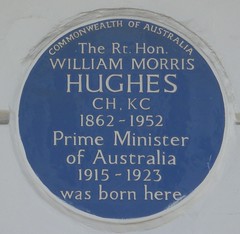William Morris Hughes
Commemorated on 3 plaques
The Rt. Hon. William Morris Hughes CH, KC 1862–1952 Prime Minister of Australia 1915-1923 was born here
7 Moreton Place, Pimlico, SW1, London, United Kingdom where they was
William Morris Hughes 1862-1952. Prif Weinidog Awstralia. Fe'i magwyd yn Llandudno ac all-ymwelodd a'r dref ddwywaith yn ystod ei oes. Prime Minister of Australia. Brought up in Llandudno and revisited the town twice in his lifetime.
Llwynon Gardens, Llandudno, United Kingdom where they lived near
The Right Honourable William Morris Hughes Premier of Australia (1916-23). Was educated in this building.
Llwynon Gardens, Llandudno, United Kingdom where they attended school



